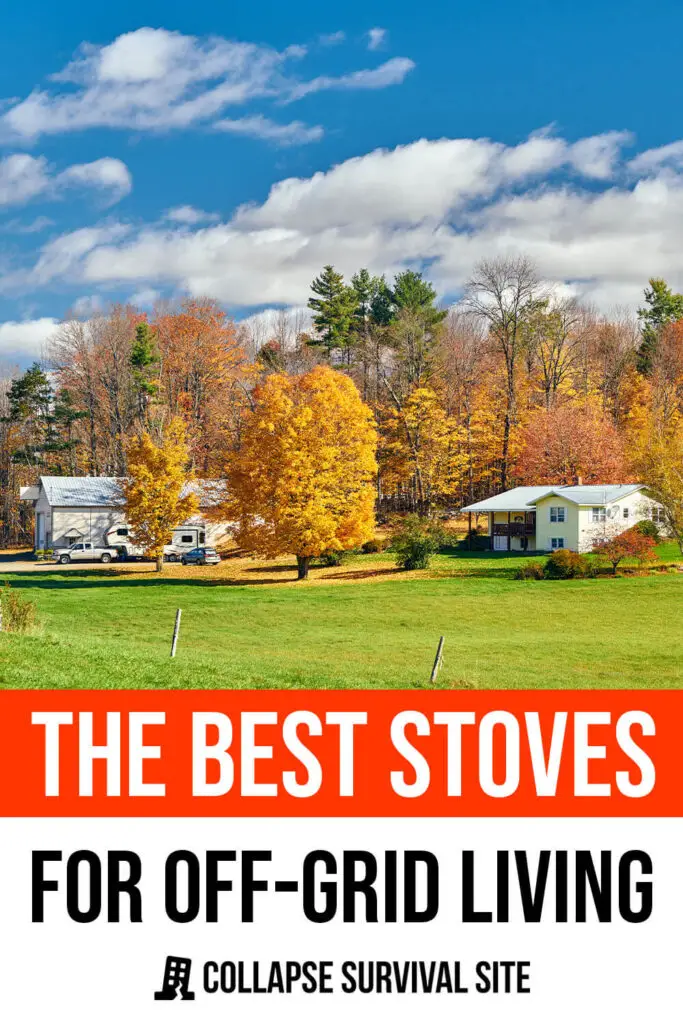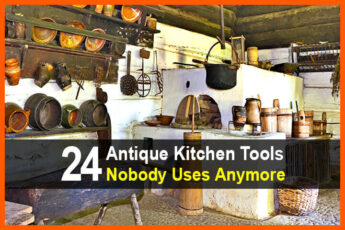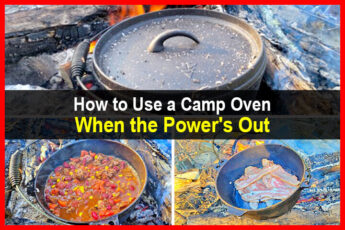Estimated reading time: 10 minutes
Living off-grid is an alluring concept, offering the promise of a sustainable, self-reliant lifestyle in harmony with nature. Central to this autonomy is the ability to cook and heat your space, making the right stove a critical component.
This guide will explore various types of off-grid stoves that can help you achieve this self-sufficiency. Whether you're interested in wood-burning stoves for their rustic charm, propane stoves for their convenience, or solar cookers for their environmental friendliness, this will teach you the ins and outs of each.
Want to save this post for later? Click Here to Pin It On Pinterest!
1. Keeping Warm and Cozy with Wood Stoves
Wood stoves are traditional heating appliances that burn wood fuel and wood-derived biomass fuel to produce heat. Typically made from cast iron or steel, they work by drawing air into the stove from the room and venting smoke out through a flue or chimney. The heat generated from the burning wood is radiated into the living space, providing warmth and comfort.
The Benefits of Wood Stoves
Wood stoves offer numerous advantages for off-grid living, making them a popular choice in many off-grid setups.
Here are the benefits of using a wood stove:
- Wood is a renewable resource that offers a sustainable heating solution, reducing dependence on non-renewable energy sources.
- Wood stoves provide a cost-effective heating option, especially when free or inexpensive wood supplies are available.
- Wood stoves offer independence from utility companies for heat.
- A wood-burning stove adds a rustic charm to your off-grid home, enhancing its aesthetic appeal.
It's often considered one of the best ways to heat your home as it doesn't rely on electricity and causes next to nothing to run over a long period.
Safety and Other Considerations
There are also considerations to be made before installing a wood stove. The initial cost of purchase and installation can be significant. Wood stoves require regular cleaning and maintenance, which can be labor-intensive.
Sourcing and storing wood can be challenging (or expensive), especially in urban areas or areas with few trees. Especially considering that you should season your wood for at least two years before using it.
Additionally, burning wood produces smoke, which can contribute to air pollution if not properly vented. The final thing to consider is that wood stoves require a chimney or flue to vent smoke, which may require modifications to your home.
Should You Use One?
In terms of ideal off-grid situations where wood stoves thrive, they are perfect for homes in rural or woodland areas where there is an abundant supply of wood. If you enjoy physical work and have the time to cut, season, and store your wood, a wood stove could be a good fit for you.
Enjoying the beauty of a real wood fire and the independence that comes with heating your own home can provide a great sense of satisfaction and comfort in off-grid living.
2. Fueling Up with Gas – Propane Stoves for Off-Grid
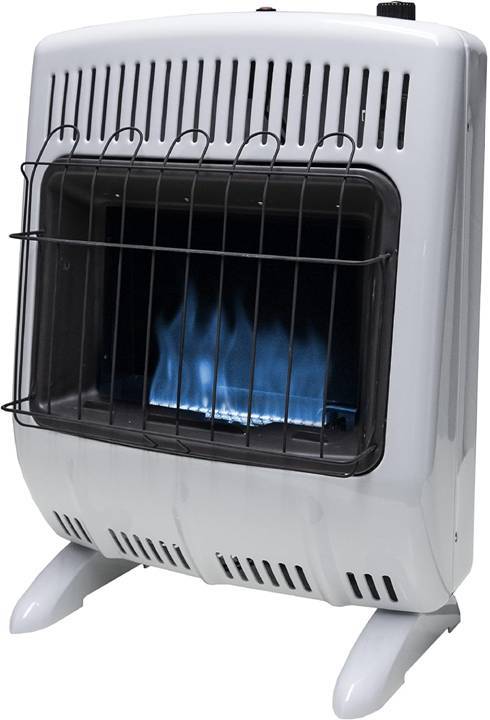
Propane stoves, often used in off-grid situations, are appliances that utilize propane, a type of liquefied petroleum gas, as a fuel source. In these stoves, a propane tank is connected via a regulator to the stove, and the flow of gas is controlled using knobs on the appliance. When the gas is turned on, it mixes with air and is ignited, producing a flame used for cooking or heating.
The Benefits of Propane Stoves
There are numerous benefits to using propane stoves in an off-grid setting. The main reason is that propane is a highly efficient fuel source, offering more energy per volume than many other fuels.
Here are some other benefits to sweeten the deal:
- It is an economical choice due to its efficiency.
- Propane is a clean-burning fuel, producing less pollution compared to wood-burning stoves.
- It is an environmentally friendly option for those concerned about their carbon footprint.
- Propane stoves provide instant heat, eliminating the wait time for heating elements to warm up.
- The ability to control the heat output accurately makes cooking or heating more convenient and precise.
- Propane can be stored indefinitely, unlike gasoline.
- There is no worry about propane expiring or losing potency as long as the tank is not damaged or leaking.
The fact that you can use it in very cold temperatures is alone enough reason to consider this fuel. For most models, you will require a power source to manage the temperature and pumps.
Safety and Other Considerations
While propane stoves offer many benefits, there are also considerations to bear in mind. Propane, like any other fuel, can be dangerous if not handled properly. It's flammable and can cause fires or explosions if leaks occur. Therefore, proper storage and maintenance of propane tanks are crucial.
Additionally, while propane itself is an affordable fuel, the initial cost of a propane stove and the necessary equipment can be significant. While propane is widely available, accessing it in remote off-grid locations can be challenging. The more remote, the more the cost is driven up.
Unlike wood stove heat, propane is considered a “wet” heat. If you're heating your home with propane then ensure your home is adequately insulated to avoid condensation buildup.
Should You Use One?
If you are living off-grid in an area where propane is readily accessible and you value efficiency, cleanliness, and control in your heating and cooking processes, a propane stove may be a great fit. Its longevity and ease of use make it an excellent choice for those seeking a reliable and convenient off-grid heating solution.
3. Heating with Oil Stoves
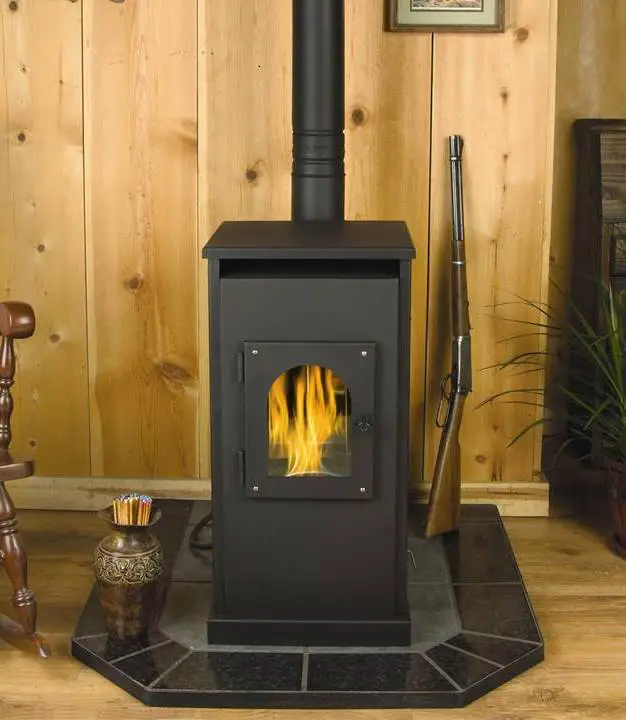
Oil stoves (also called oil furnaces), another popular choice for off-grid living, utilize oil—typically kerosene—as their primary fuel source. The operation of these stoves is straightforward: oil from a tank feeds into a burner by gravity or with the aid of a pump, where it gets vaporized and ignited, producing heat.
The Benefits of Oil Stoves
Oil stoves offer numerous benefits for off-grid living. The oil, particularly kerosene or gas oil (sometimes called “Red Diesel”), has a high energy density, providing efficient and long-lasting heat.
- Oil is relatively safe to store and handle compared to other fuels, reducing the risk of accidental ignition or explosion.
- An oil stove requires minimal maintenance and can function effectively for years with proper care.
- Unlike a wood stove, an oil stove produces less smoke and ash, benefiting both health and cleanliness.
With these kinds of stoves you still want to treat them with care as falling behind on maintenance can become quite dangerous.
Fire Hazards, Fumes, and Other Considerations
This is why, despite their benefits, there are considerations when using oil stoves off-grid. For example, fire hazards exist if the stove malfunctions or is not properly maintained. You'll need electricity to run the pumps and fan so an off-grid power setup is needed.
The quality of oil used can also affect operation; inferior or contaminated oil may produce harmful fumes or soot. Fuel availability and price fluctuations are another consideration, especially in remote areas. Ensure there is a lot of ventilation or there is a chance of a buildup of fumes, potentially causing respiratory issues.
Should You Use One?
Oil stoves can be an excellent choice for off-grid living situations where fuel availability isn't a concern, and long-term, low-maintenance heating is desired. They are especially suitable in environments where clean burning and efficient heat production are prioritized. Just be sure to keep the stove clean and maintained to reduce the chances of an uncontrolled fire.
4. Multi-Fuel Stoves
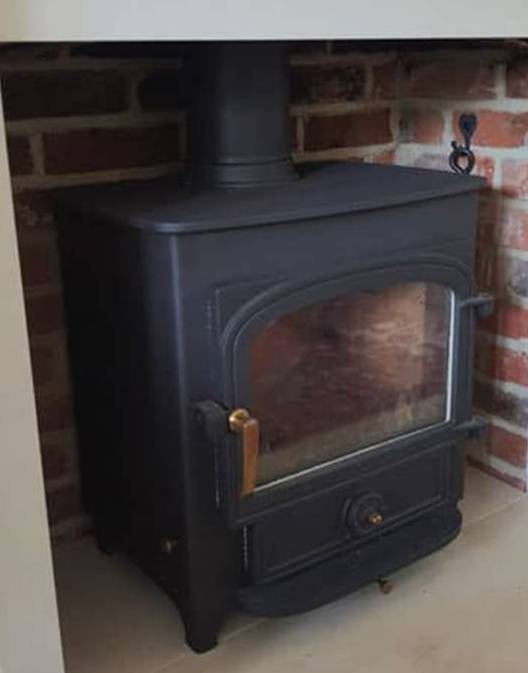
Multi-fuel stoves are versatile heating appliances that can burn a variety of different fuels, such as wood, peat, coal, and even certain types of waste. They operate by burning the fuel in an enclosed chamber, generating heat that can be used to warm a home, cook food, or heat water. The ability to use different types of fuel provides flexibility, making them a popular choice for off-grid living.
The Benefits of Multi-Fuel Stoves
A significant advantage of multi-fuel stoves is their adaptability to different fuel types, providing a reliable heat source irrespective of the availability of a particular fuel.
Here are some more benefits:
- High efficiency: Multi-fuel stoves convert a higher percentage of fuel into heat compared to traditional fireplaces or single-fuel stoves.
- Eco-friendly choice: They reduce dependence on fossil fuels and enable the use of renewable sources like wood.
- Robust and durable design: Multi-fuel stoves are built to withstand harsh conditions, making them suitable for off-grid living.
Even though these are versatile stoves, you don't see them very often used in off-grid setups. It can be for many reasons but the main one revolves around the fuel itself.
It's Not a Single-Stove Solution
The stove's performance will vary depending on the fuel used, with some fuels burning hotter or cleaner than others. Certain types of fuel may also be harder to source in some regions, impacting the stove's convenience. For these reasons, you'll want to have a secondary source just in case this one breaks on you.
The maintenance of a multi-fuel stove can be more complex due to the different residues left by various fuels. Cost consideration is crucial, as these stoves can be more expensive upfront than single-fuel alternatives.
Should You Use One?
Multi-fuel stoves are ideal for off-grid situations where maximum flexibility in fuel choice is desired. If you live in an area with a reliable supply of various fuels, or you wish to utilize waste materials for heating, these stoves can be highly beneficial. However, be prepared for potential higher upfront costs and regular maintenance to ensure optimal performance.
5. Efficient Rocket Stoves
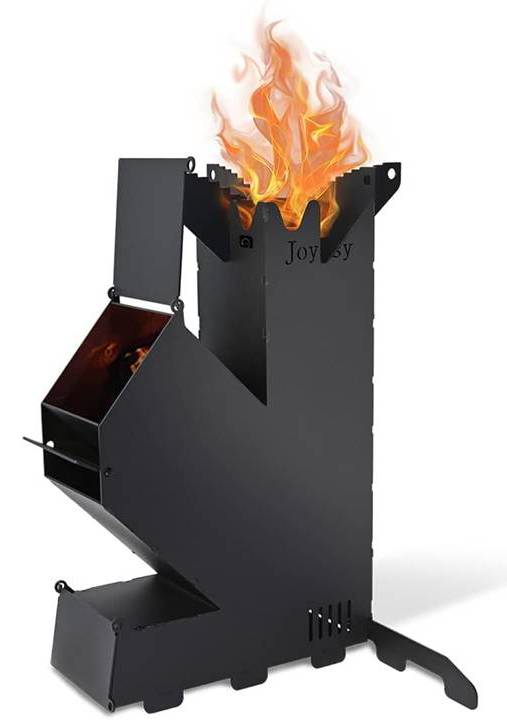
Rocket stoves are efficient cooking devices that utilize small-diameter wood fuel and burn at high temperatures. They work on a principle of complete combustion, which ensures that all the potential energy in the wood is utilized.
This is accomplished by insulating the combustion chamber to prevent heat loss and designing the stove to draw in more air as the fire burns hotter, creating a positive feedback loop of increased efficiency.
The Benefits of Rocket Stoves
Rocket stoves have several advantages for off-grid use. A big draw is that they are extremely fuel efficient, requiring only a fraction of the wood needed by traditional stoves.
- Their high-heat, low-smoke combustion process makes them more eco-friendly than conventional alternatives.
- Their straightforward design and construction mean they can be built and repaired using locally available materials.
- The high cooking temperatures achieved allow for quick meal preparation, reducing cooking time and conserving fuel.
There is a time and place for these types of stoves, however. Unlike traditional wood stoves, there are a few “limitations” that can produce challenges in colder weather or while cooking.
Considerations
While they are fuel-efficient, they do require dry, small-diameter wood, which may necessitate additional preparation time. The high cooking temperatures can also make heat regulation more challenging, particularly for those unused to cooking on rocket stoves.
Additionally, while they are simple to build, they can require more maintenance than a conventional stove due to the high heat causing faster wear and tear.
Should You Use One?
Rocket stoves are an excellent choice for off-grid situations, particularly in locations where wood is plentiful and you have the time to prepare it properly. They're also suitable for those who prioritize environmental sustainability and wish to minimize their impact on the local ecosystem.
However, the potential maintenance needs and cooking skills required should also be taken into account when deciding if a rocket stove is the right choice for your off-grid setup.
Final Thoughts
Choosing the right stove for off-grid living can be a process. Wood stoves offer charm, and cost-effectiveness, while propane stoves provide instant heat and less emission. Multi-fuel stoves offer versatility, while rocket stoves excel in efficiency.
It's important to consider maintenance and fuel sourcing. When in doubt, have a wood stove mixed with another source of heat to make sure you don't go cold.
Like this post? Don't Forget to Pin It On Pinterest!


